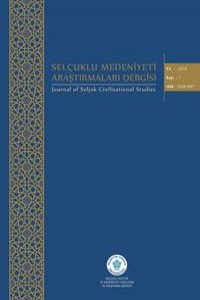Öz
Abstract:
The concept of justice has always been one of the central issues that
have occupied the minds of many philosophers, social scientists and political writers from the ancient to
the modern times. So far most of the studies appear to
have focused on the meaning and definition of this pivotal concept, as well as
its social, economic and political implications. Several prominent Muslim
philosophers in the past, such as al-KindÊ, al-FÉrÉbÊ, Ibn
SÊnÉ, Ibn Rushd, AbË Miskawayh, and NaÎÊr al-Din ÙËsÊ, devoted a significant segment of their
political and ethical writings to the subject-matter of justice, which they
treated and examined more or less in a similar fashion as the ancient Greek
philosophers, especially Plato and Aristotle, had done. Like them, they
developed a rational conception of justice, which is generally viewed as
natural, eternal, and immutable and ethically as the most comprehensive virtue. Muslim theosophers or
Sufi philosophers, such as al-GhazÉlÊ,
Ibn al-‘ArabÊ and MawlÉnÉ RËmÊ, have initially conceived justice in the same
form as the philosophers just-mentioned above and, as will be seen in this
study, elaborated it further mainly within the context of metaphysical wisdom
that is eternally implanted by God in the universe. Then later, on the basis of
their own interpretations of the relevant verses of the Qur’an and the
Prophetic sayings, they developed their conception of justice.
Anahtar Kelimeler
Justice wisdom social justice metaphysical wisdom metaphysical justice balance injustice al-GhazÉlÊ Ibn al-‘ArabÊ MawlÉnÉ RËmÊ
Kaynakça
- Baruddin, Bat. AbË ‘AlÊ Miskawayh: A Study of His Historical and Social Thought. New Delhi: Islamic Book Foundation, 1991.
- Al-FÉrÉbÊ, AbË NaÎr. Fusul al-Madani: Aphorisms of the Statesman. Ed. With Translation, Introduction and Notes by D.M. Dunlop. Cambridge: University of Cambridge Press, 1961.
- Al-GhazÉlÊ, AbË ×Émid. The Ninety-Nine Names Beautiful Names of God (a-MaqÎad al-asnÉ fÊ sharÍ asmÉ AllÉh al-ÍusnÉ). Trans. By D. B. Burrell and N. Daher. Cambridge: The Islamic Texts Society, 1992.
- Can, Şefik. Hz. Mevlânâ’nın Rubâileri. 2 vols. Konya: İl Kültür ve Turizm Müdürlüğü, 2005.
- Chittick, William C. The Sufi Path of Knowledge. Albany: SUNY, 1989.
- Marmura, Michael E. Trans. “Avicenna, Healing: Metaphysics X,” “Avicenna on the Proof of Prophecies and the Interpretation of the Prophets’ Symbols and Metaphors,” in Medieval Political Philosophy: A Sourcebook. Eds. Ralph Lerner and Muhsin Mahdi. Ithaca: Cornell University Press, 1972.
- Mahdi, Muhsin Trans. “AlfÉrÉbÊ: The Attainment of Happiness,” in Medieval Political Philosophy: A Sourcebook. Eds. Ralph Lerner and Muhsin Mahdi. Ithaca: Cornell University Press, 1972.
- Miskawayh, AbË ‘AlÊ. An Unpublished Treatise of Miskawayh on Justice or RisÉla fÊ MÉhiyat al-‘Adl li Miskawayh. Khan, M.S. Ed. With translation, notes, annotations Leiden: E.J. Brill, 1964.
Öz
Kaynakça
- Baruddin, Bat. AbË ‘AlÊ Miskawayh: A Study of His Historical and Social Thought. New Delhi: Islamic Book Foundation, 1991.
- Al-FÉrÉbÊ, AbË NaÎr. Fusul al-Madani: Aphorisms of the Statesman. Ed. With Translation, Introduction and Notes by D.M. Dunlop. Cambridge: University of Cambridge Press, 1961.
- Al-GhazÉlÊ, AbË ×Émid. The Ninety-Nine Names Beautiful Names of God (a-MaqÎad al-asnÉ fÊ sharÍ asmÉ AllÉh al-ÍusnÉ). Trans. By D. B. Burrell and N. Daher. Cambridge: The Islamic Texts Society, 1992.
- Can, Şefik. Hz. Mevlânâ’nın Rubâileri. 2 vols. Konya: İl Kültür ve Turizm Müdürlüğü, 2005.
- Chittick, William C. The Sufi Path of Knowledge. Albany: SUNY, 1989.
- Marmura, Michael E. Trans. “Avicenna, Healing: Metaphysics X,” “Avicenna on the Proof of Prophecies and the Interpretation of the Prophets’ Symbols and Metaphors,” in Medieval Political Philosophy: A Sourcebook. Eds. Ralph Lerner and Muhsin Mahdi. Ithaca: Cornell University Press, 1972.
- Mahdi, Muhsin Trans. “AlfÉrÉbÊ: The Attainment of Happiness,” in Medieval Political Philosophy: A Sourcebook. Eds. Ralph Lerner and Muhsin Mahdi. Ithaca: Cornell University Press, 1972.
- Miskawayh, AbË ‘AlÊ. An Unpublished Treatise of Miskawayh on Justice or RisÉla fÊ MÉhiyat al-‘Adl li Miskawayh. Khan, M.S. Ed. With translation, notes, annotations Leiden: E.J. Brill, 1964.
Ayrıntılar
| Bölüm | Araştırma Makaleleri |
|---|---|
| Yazarlar | |
| Yayımlanma Tarihi | 20 Aralık 2016 |
| Gönderilme Tarihi | 19 Aralık 2016 |
| Yayımlandığı Sayı | Yıl 2016 Sayı: 1 |
Kaynak Göster


